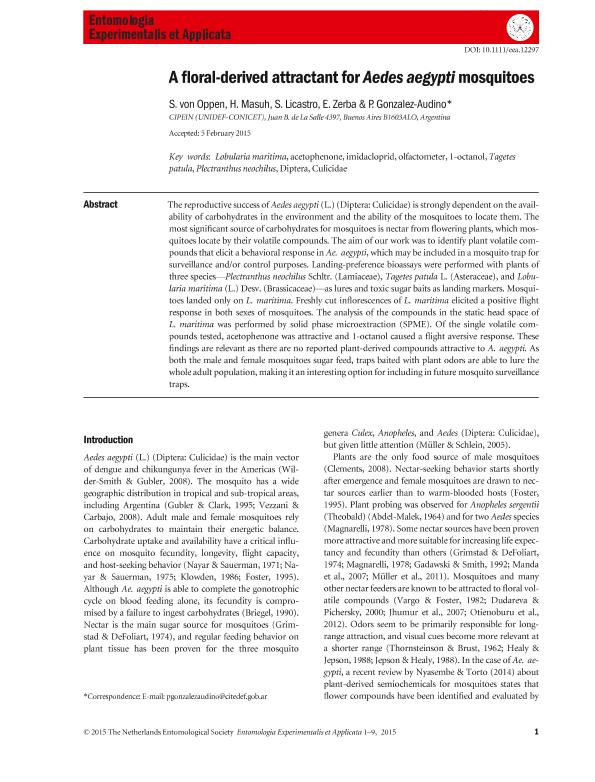Mostrar el registro sencillo del ítem
dc.contributor.author
Von Oppen, Santiago Miguel

dc.contributor.author
Masuh, Hector Mario

dc.contributor.author
Licastro, Susana Mónica

dc.contributor.author
Zerba, Eduardo Nicolás

dc.contributor.author
Gonzalez Audino, Paola Andrea

dc.date.available
2018-03-13T19:19:53Z
dc.date.issued
2015-06
dc.identifier.citation
Von Oppen, Santiago Miguel; Masuh, Hector Mario; Licastro, Susana Mónica; Zerba, Eduardo Nicolás; Gonzalez Audino, Paola Andrea; A floral-derived attractant for Aedes aegypti mosquitoes; Wiley Blackwell Publishing, Inc; Entomologia Experimentalis et Applicata; 155; 3; 6-2015; 184-192
dc.identifier.issn
0013-8703
dc.identifier.uri
http://hdl.handle.net/11336/38689
dc.description.abstract
The reproductive success of Aedes aegypti (L.) (Diptera: Culicidae) is strongly dependent on the availability of carbohydrates in the environment and the ability of the mosquitoes to locate them. The most significant source of carbohydrates for mosquitoes is nectar from flowering plants, which mosquitoes locate by their volatile compounds. The aim of our work was to identify plant volatile compounds that elicit a behavioral response in Ae. aegypti, which may be included in a mosquito trap for surveillance and/or control purposes. Landing-preference bioassays were performed with plants of three species-Plectranthus neochilus Schltr. (Lamiaceae), Tagetes patula L. (Asteraceae), and Lobularia maritima (L.) Desv. (Brassicaceae)-as lures and toxic sugar baits as landing markers. Mosquitoes landed only on L. maritima. Freshly cut inflorescences of L. maritima elicited a positive flight response in both sexes of mosquitoes. The analysis of the compounds in the static head space of L. maritima was performed by solid phase microextraction (SPME). Of the single volatile compounds tested, acetophenone was attractive and 1-octanol caused a flight aversive response. These findings are relevant as there are no reported plant-derived compounds attractive to A. aegypti. As both the male and female mosquitoes sugar feed, traps baited with plant odors are able to lure the whole adult population, making it an interesting option for including in future mosquito surveillance traps.
dc.format
application/pdf
dc.language.iso
eng
dc.publisher
Wiley Blackwell Publishing, Inc

dc.rights
info:eu-repo/semantics/openAccess
dc.rights.uri
https://creativecommons.org/licenses/by-nc-sa/2.5/ar/
dc.subject
1-Octanol
dc.subject
Acetophenone
dc.subject
Culicidae
dc.subject
Diptera
dc.subject
Imidacloprid
dc.subject
Lobularia Maritima
dc.subject
Olfactometer
dc.subject
Plectranthus Neochilus
dc.subject
Tagetes Patula
dc.subject.classification
Otras Ciencias Biológicas

dc.subject.classification
Ciencias Biológicas

dc.subject.classification
CIENCIAS NATURALES Y EXACTAS

dc.title
A floral-derived attractant for Aedes aegypti mosquitoes
dc.type
info:eu-repo/semantics/article
dc.type
info:ar-repo/semantics/artículo
dc.type
info:eu-repo/semantics/publishedVersion
dc.date.updated
2018-03-09T14:45:49Z
dc.journal.volume
155
dc.journal.number
3
dc.journal.pagination
184-192
dc.journal.pais
Reino Unido

dc.journal.ciudad
Londres
dc.description.fil
Fil: Von Oppen, Santiago Miguel. Consejo Nacional de Investigaciones Científicas y Técnicas. Unidad de Investigación y Desarrollo Estratégico para la Defensa. Ministerio de Defensa. Unidad de Investigación y Desarrollo Estratégico para la Defensa; Argentina
dc.description.fil
Fil: Masuh, Hector Mario. Consejo Nacional de Investigaciones Científicas y Técnicas. Unidad de Investigación y Desarrollo Estratégico para la Defensa. Ministerio de Defensa. Unidad de Investigación y Desarrollo Estratégico para la Defensa; Argentina
dc.description.fil
Fil: Licastro, Susana Mónica. Consejo Nacional de Investigaciones Científicas y Técnicas. Unidad de Investigación y Desarrollo Estratégico para la Defensa. Ministerio de Defensa. Unidad de Investigación y Desarrollo Estratégico para la Defensa; Argentina
dc.description.fil
Fil: Zerba, Eduardo Nicolás. Consejo Nacional de Investigaciones Científicas y Técnicas. Unidad de Investigación y Desarrollo Estratégico para la Defensa. Ministerio de Defensa. Unidad de Investigación y Desarrollo Estratégico para la Defensa; Argentina
dc.description.fil
Fil: Gonzalez Audino, Paola Andrea. Consejo Nacional de Investigaciones Científicas y Técnicas. Unidad de Investigación y Desarrollo Estratégico para la Defensa. Ministerio de Defensa. Unidad de Investigación y Desarrollo Estratégico para la Defensa; Argentina
dc.journal.title
Entomologia Experimentalis et Applicata

dc.relation.alternativeid
info:eu-repo/semantics/altIdentifier/doi/http://dx.doi.org/10.1111/eea.12297
dc.relation.alternativeid
info:eu-repo/semantics/altIdentifier/url/http://onlinelibrary.wiley.com/doi/10.1111/eea.12297/abstract
Archivos asociados
